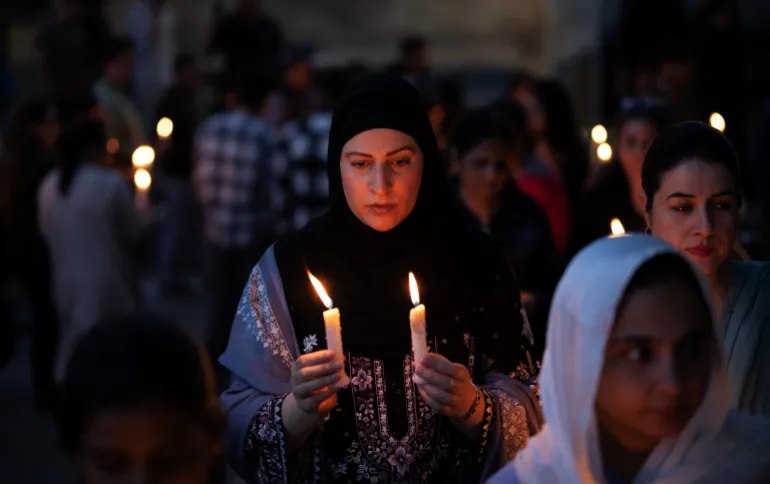Kashmir attack live: India shuts border with Pakistan after Pahalgam attack

India Responds Firmly After Deadly Pahalgam Attack
The aftermath of the horrific attack in Pahalgam, Indian-administered Kashmir, which claimed the lives of 26 people, continues to unfold. The Indian government is taking decisive actions in response.
India’s Retaliation Measures
India’s Foreign Ministry has announced a significant decision: Pakistani nationals will no longer be permitted to travel to India under the SAARC visa exemption programme. Moreover, any visas previously issued under this scheme are now “deemed cancelled,” and any Pakistani national currently in India with such a visa has 48 hours to leave the country.
Adding to the escalating response, India’s defence minister has vowed a swift and strong reaction against those responsible for planning and executing the Pahalgam attack.
The Pahalgam Attack: A Deep Dive
Security forces are currently engaged in a widespread search for the gunmen responsible for this attack, which marks the deadliest assault on civilians in the disputed region in recent years.
Prime Minister Narendra Modi, cutting short his state visit to Saudi Arabia, has strongly condemned the “heinous act” and promised that the attackers “will be brought to justice.”
A relatively unknown group, The Resistance Front, has claimed responsibility for the attack via a social media message, citing discontent over the alleged settlement of more than 85,000 “outsiders” in the region, which they claim is causing a “demographic change.”
Eyewitness Accounts and the Human Cost
The attack occurred in the Baisaran Valley, a popular tourist destination known for its stunning hilltop meadow surrounded by dense pine forests. According to a security source cited by Reuters, approximately 1,000 tourists and 300 local service providers were present in the area when the attack took place.
The source revealed that some tourists were targeted at eateries within the meadow, while others were taken into the forests and shot.
Prashant Satpathy, visiting from the eastern state of Odisha with his wife and son, was among the victims. His wife recounted to local media the moment he was struck: “He collapsed before my eyes,” she said, describing how a bullet hit him in the head after they had just finished a zipline ride.
Adil Hussain Shah, a local pony ride operator from Pahalgam, also lost his life in the attack. Jammu and Kashmir Chief Minister Omar Abdullah, after visiting Shah’s family, told reporters that Shah “was a person who tried to stop the attack.”
Tourism’s Vital Role in Kashmir
Tourism is a crucial pillar of the local economy, contributing nearly seven percent to the region’s GDP.
The influx of tourists also serves as a visual affirmation of the Modi administration’s claim of having restored peace and stability to the region.
Key Points from India’s Foreign Secretary’s Address
Earlier today, India’s foreign secretary announced an “unrelenting” pursuit of those responsible for the attacks. Here’s a summary of the major points:
- Pakistani nationals are banned from traveling to India under the SAARC visa exemption program. Existing visas are cancelled.
- The Attari border crossing with Pakistan is closed with immediate effect.
- Pakistani military advisors at the High Commission in New Delhi are declared “persona non grata” and given one week to leave.
- India will withdraw its own military advisors from the High Commission in Islamabad.
- The Indus Waters Treaty, a water allocation pact between India and Pakistan, is suspended with immediate effect.
UN’s Response
United Nations chief Antonio Guterres has conveyed his condolences to the victims’ families. His spokesperson emphasized that “attacks against civilians are unacceptable under any circumstances.”
When asked about concerns regarding heightened tensions and potential cross-border conflict, the UN spokesman stated that they would not “predict or analyse what may happen,” focusing instead on condemning the “horrific terror attack.”
Understanding the Kashmir Dispute: A Brief History
Both Pakistan and India claim Kashmir in its entirety, although each administers different parts of the region.
Key Dates in the Kashmir Conflict
- 1948: The UN Security Council adopted Resolution 47, calling for a ceasefire, troop withdrawals, and a referendum in Kashmir. However, disagreements between India and Pakistan stalled the process.
- 1950: Kashmir was granted special status under the Indian Constitution, ensuring significant autonomy for the region.
- 1980-1990: An armed separatist rebellion erupted, driven by local resentment and demands for independence or a merger with Pakistan.
- 1999: A decade of violence culminated in the Kargil War between India and Pakistan over Kashmir.
- 2019: India revoked the region’s special status, imposed a military lockdown, and detained local leaders.
- 2024: Elections were held, and an elected government now governs the region. A new lieutenant governor was appointed by New Delhi, but many in the region continue to demand greater autonomy.
Pahalgam Attack: Recapping the Events
Heavily armed men launched a surprise attack in Pahalgam, a popular tourist destination in Indian-administered Kashmir, on Tuesday, resulting in the deaths of at least 26 people.
Indian officials have confirmed that 25 of the deceased were Indian nationals, while one was Nepalese.
The attackers “opened indiscriminate fire at Baisaran meadow, a scenic uphill area accessible only by foot or pony rides,” catching many tourists off guard.
The Resistance Front (TRF), linked to the Pakistan-based Lashkar-e-Taiba, claimed responsibility for the attack, citing their opposition to the settlement of more than 85,000 “outsiders” in Kashmir, alleging that it leads to “demographic change.”
In the aftermath of the attack, Indian police detained at least 1,500 people across Jammu and Kashmir as part of their investigation.
